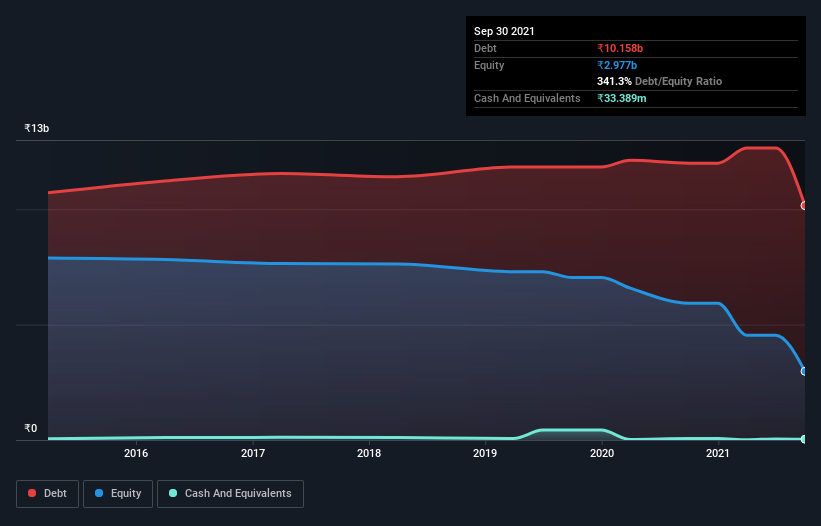- India
- /
- Hospitality
- /
- NSEI:ASIANHOTNR
Is Asian Hotels (North) (NSE:ASIANHOTNR) Weighed On By Its Debt Load?

Legendary fund manager Li Lu (who Charlie Munger backed) once said, 'The biggest investment risk is not the volatility of prices, but whether you will suffer a permanent loss of capital.' So it seems the smart money knows that debt - which is usually involved in bankruptcies - is a very important factor, when you assess how risky a company is. We note that Asian Hotels (North) Limited (NSE:ASIANHOTNR) does have debt on its balance sheet. But should shareholders be worried about its use of debt?
What Risk Does Debt Bring?
Debt is a tool to help businesses grow, but if a business is incapable of paying off its lenders, then it exists at their mercy. Part and parcel of capitalism is the process of 'creative destruction' where failed businesses are mercilessly liquidated by their bankers. However, a more frequent (but still costly) occurrence is where a company must issue shares at bargain-basement prices, permanently diluting shareholders, just to shore up its balance sheet. Of course, the upside of debt is that it often represents cheap capital, especially when it replaces dilution in a company with the ability to reinvest at high rates of return. The first step when considering a company's debt levels is to consider its cash and debt together.
Check out our latest analysis for Asian Hotels (North)
What Is Asian Hotels (North)'s Debt?
You can click the graphic below for the historical numbers, but it shows that Asian Hotels (North) had ₹10.2b of debt in September 2021, down from ₹12.0b, one year before. Net debt is about the same, since the it doesn't have much cash.

How Healthy Is Asian Hotels (North)'s Balance Sheet?
We can see from the most recent balance sheet that Asian Hotels (North) had liabilities of ₹3.97b falling due within a year, and liabilities of ₹8.79b due beyond that. Offsetting these obligations, it had cash of ₹33.4m as well as receivables valued at ₹114.2m due within 12 months. So it has liabilities totalling ₹12.6b more than its cash and near-term receivables, combined.
This deficit casts a shadow over the ₹1.55b company, like a colossus towering over mere mortals. So we'd watch its balance sheet closely, without a doubt. At the end of the day, Asian Hotels (North) would probably need a major re-capitalization if its creditors were to demand repayment. When analysing debt levels, the balance sheet is the obvious place to start. But you can't view debt in total isolation; since Asian Hotels (North) will need earnings to service that debt. So if you're keen to discover more about its earnings, it might be worth checking out this graph of its long term earnings trend.
Over 12 months, Asian Hotels (North) made a loss at the EBIT level, and saw its revenue drop to ₹1.0b, which is a fall of 32%. To be frank that doesn't bode well.
Caveat Emptor
Not only did Asian Hotels (North)'s revenue slip over the last twelve months, but it also produced negative earnings before interest and tax (EBIT). Indeed, it lost a very considerable ₹210m at the EBIT level. Reflecting on this and the significant total liabilities, it's hard to know what to say about the stock because of our intense dis-affinity for it. Like every long-shot we're sure it has a glossy presentation outlining its blue-sky potential. But the reality is that it is low on liquid assets relative to liabilities, and it lost ₹9.9b in the last year. So we're not very excited about owning this stock. Its too risky for us. The balance sheet is clearly the area to focus on when you are analysing debt. However, not all investment risk resides within the balance sheet - far from it. For example Asian Hotels (North) has 2 warning signs (and 1 which shouldn't be ignored) we think you should know about.
If, after all that, you're more interested in a fast growing company with a rock-solid balance sheet, then check out our list of net cash growth stocks without delay.
New: Manage All Your Stock Portfolios in One Place
We've created the ultimate portfolio companion for stock investors, and it's free.
• Connect an unlimited number of Portfolios and see your total in one currency
• Be alerted to new Warning Signs or Risks via email or mobile
• Track the Fair Value of your stocks
Have feedback on this article? Concerned about the content? Get in touch with us directly. Alternatively, email editorial-team (at) simplywallst.com.
This article by Simply Wall St is general in nature. We provide commentary based on historical data and analyst forecasts only using an unbiased methodology and our articles are not intended to be financial advice. It does not constitute a recommendation to buy or sell any stock, and does not take account of your objectives, or your financial situation. We aim to bring you long-term focused analysis driven by fundamental data. Note that our analysis may not factor in the latest price-sensitive company announcements or qualitative material. Simply Wall St has no position in any stocks mentioned.
About NSEI:ASIANHOTNR
Slightly overvalued with imperfect balance sheet.
Similar Companies
Market Insights
Community Narratives




